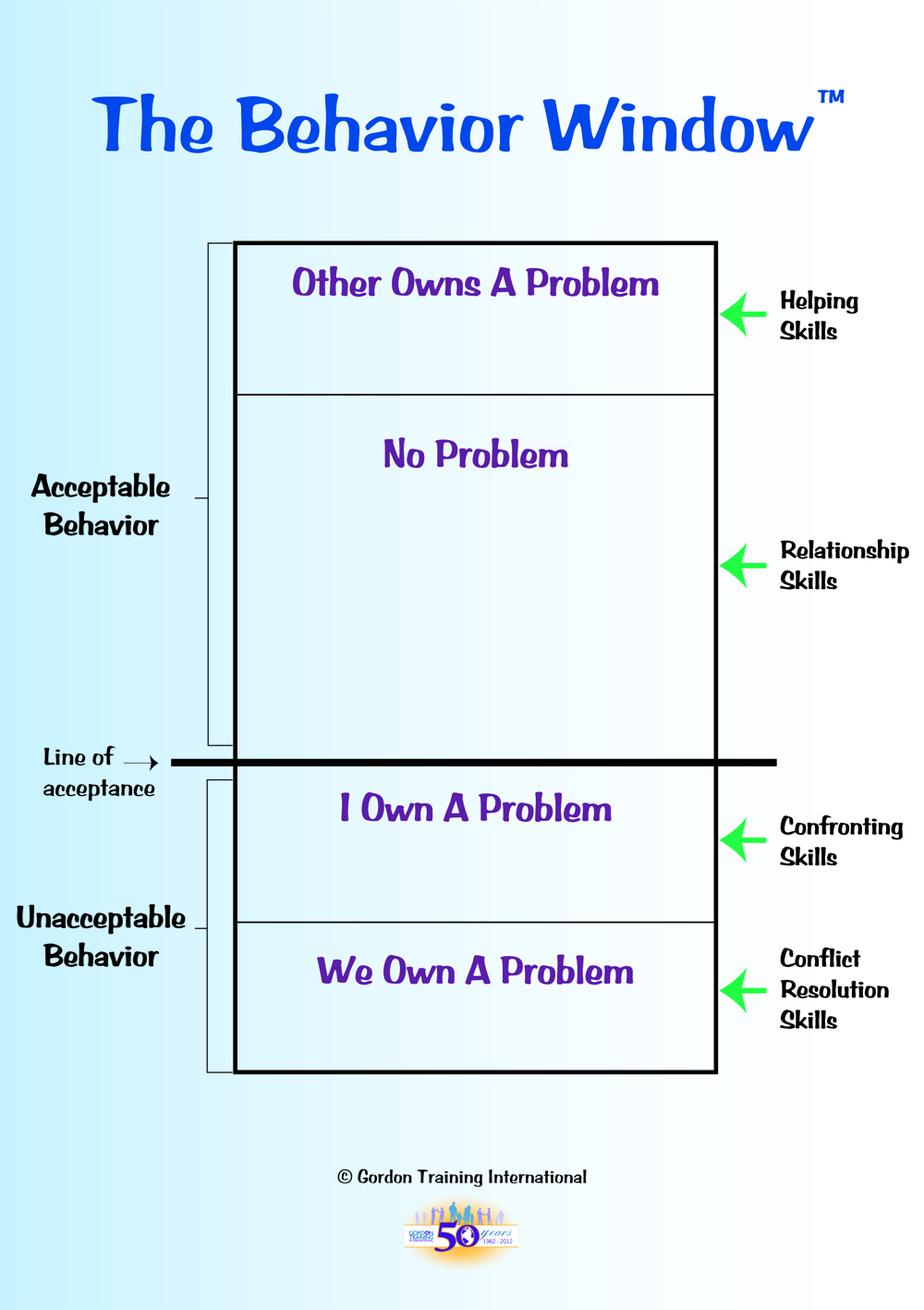We spend a lot of time, when we do Leader Effectiveness Training, thinking about the top and the bottom of the Behavior Window—the areas where problems live.
In part, that’s natural, because L.E.T. is a set of skills that have to be practiced—a lot—before they become a natural and reflexive way of interacting.
 But there’s a whole ‘nother big part of that Behavior Window—the middle. The part where, hopefully, most of us spend the majority of our time with coworkers—you know, brewing a morning coffee in the break room, or chatting over lunch, or (ideally) working together on projects we’re all super fired-up about.
But there’s a whole ‘nother big part of that Behavior Window—the middle. The part where, hopefully, most of us spend the majority of our time with coworkers—you know, brewing a morning coffee in the break room, or chatting over lunch, or (ideally) working together on projects we’re all super fired-up about.
Does it come as a surprise to hear that I-Messages also have a place there, in the no-problem area? It shouldn’t.
At the heart of it, an I-Message is simply a form of self-disclosure. And that builds relationships. A viral story that’s been gaining a lot of attention lately claims that just asking and answering 36 questions can cause two people who are being completely open and honest to fall in love. That’s the crazy, awesome, mad relationship-building power of self-disclosure.
Declarative I-Messages: “This is a Bit of Info About the Real Me”
A basic declarative I-Message is honest, direct, to the point, and authentic. You’re putting your real, true thoughts and feelings out there. It’s not shrouded or masked in disclaimers, vague language, indirect or wishy-washy hemming and hawing. Your likes, and your dislikes, and your beliefs and ideas—sometimes even your fundamental values. (In the workplace, we know some of these things are better left unsaid (because values collisions can lead to unnecessary tension that can’t be resolved at all; see, OMG, every election season ever…).
But appropriate self-disclosure helps others get to know you better, and that’s important when you spend nearly as many waking hours every week with coworkers as you do with your family. Declarative I-Messages can help the people you see and work with every day (from colleagues to supervisors and even your direct reports) understand how you see the world and how you approach life.
Here are just a few examples of Declarative I-Messages:
- “I believe we should bring back Home Ec. in High School so twentysomethings who tweet all day about Adulting will know how to basic things like setting up a budget and making their own dinner when they get out on their own.”
- “I think that light roast coffee is an egregious sin against humanity.”
- “I feel discouraged about the possibility of ever owning a home in this area—but then, hey, if the roof ever leaks and I’m still renting, not my problem, right?”
Preventive I-Messages: When You See Trouble Coming, Share Your Needs Ahead of Time
It’s not confronting if it hasn’t happened yet.
We’re still in the no-problem area, but I can look into my crystal ball and see a storm a-brewin’. The Holiday Crunch is in ten weeks, three people have scheduled time off, and the Big Project Plan just hit the Inbox—with a really important deadline penciled in for the first week of January. Somebody just proposed a team celebratory bash, and one of the location options is a swanky club known mainly for loud music and craft cocktails, (a personal vision of Hades for you). Your company is about to bring on a big client in another city; you and your spouse are about to start trying to conceive and you’d rather not be on the team that has to take on heavy travel.
Preventive I-Messages send out self-disclosing information into the world before there’s a problem, letting everybody who needs to be aware know that you have a need that you want to meet and how you want events to turn out.
Some examples of work-appropriate Preventive I-Messages:
- “I’m concerned about the January deadline because half the team responsible for the work will be out-of-office for the weeks leading up to it, and I won’t be able to complete this sprint alone.”
- “Celebrating successes together is really important, and I hope everybody will understand that if the group is going to Club Hades, I’ll be there in spirit, but my senses just get painfully overwhelmed in that sort of atmosphere.”
- “I’m thrilled about the new client and want to contribute in any way I can; at the same time, my spouse and I are about to try to start a family and I need to be home as much as possible, and I hope we can take that into account when we’re making assignments for the travel team.”
Appreciative I-Messages: No, They Aren’t “Buttering Up”
We’ve saved the best for last: The Appreciative I-Message.
 If the only kind of I-Message you ever heard in the workplace was the Confrontive I-Message, you’d really start to hate the word “I,” wouldn’t you? Of course you would. Thankfully, there’s a flip-side, and it doesn’t cost a thing. An Appreciative I-Message, like a Declarative I-Message, is a genuine, heartfelt, honest, no-BS piece of self-disclosure, but it’s about somebody else.
If the only kind of I-Message you ever heard in the workplace was the Confrontive I-Message, you’d really start to hate the word “I,” wouldn’t you? Of course you would. Thankfully, there’s a flip-side, and it doesn’t cost a thing. An Appreciative I-Message, like a Declarative I-Message, is a genuine, heartfelt, honest, no-BS piece of self-disclosure, but it’s about somebody else.
It’s an expression of gratitude, or appreciation, or admiration, or regard for somebody else’s behavior.
Maybe somebody negotiated some particularly treacherous political waters with amazing finesse. Perhaps the whole team cranked through the night and came up with a creative campaign that’s knock-your-socks-off-awesome. Maybe you just have a team member who’s always chipper and humorous and you want to acknowledge that his energy contributes to morale.
Time to haul out the Appreciative I-Message. There’s no quota and no limit; just make sure they’re genuine. (And don’t use them as roadblocks at the wrong time; remember, we’re talking about I-Messages in the no-problem area here.)
- “I appreciate how quickly you turned around that creative brief, John.”
- “I’m genuinely proud to work with a team that gets the issues and focuses on them without any extraneous distractions, everybody.”
- “I value your contributions in meetings, Shae; you’re always prepared and insightful.”

